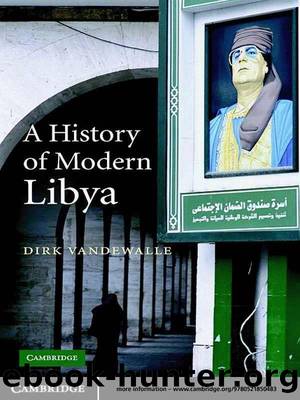A History of Modern Libya by Vandewalle

Author:Vandewalle
Language: eng
Format: mobi
ISBN: 9781139057653
Publisher: Cambridge University Press
Published: 2011-03-01T00:00:00+00:00
SYMBOLS, MYTHS, ISLAM, AND OPPOSITION
Although Libya with its small population could never claim equal status with other revolutionary nations, Qadhafi considered what had happened in Libya after 1969 as one of the great twentieth-century revolutions for social liberation. In The Green Book, the Libyan leader portrays the Libyan revolution as an inevitable, historical process of social, economic, and political development â hence the grandiloquent claim of the Jamahiriyya being the alternative to capitalism and communism. In his speeches and exhortations since 1969, the Libyan leader has constantly invoked a sense of uniqueness, grounded in Arab history and tradition, in ways that resonated within Libyan culture and experience. But, eventually, the use of a combination of symbols, myths, and careful attempts to exploit the charismatic qualities of the Libyan leader assumed an instrumental purpose as well: bridging the gap between The Green Bookâs precise delineation of the countryâs formal political structures and the reality of an increasingly exclusionary political system.
When reading Qadhafiâs speeches â painstakingly assembled in yearly volumes, accompanied by extensive commentaries, and published by the Green Book Center in Tripoli â one is struck immediately by the repeated and powerful references to shared traditions within the country and within the region, to notions of a common history that has pitted Libyans against the West, and to symbols that are uniquely Libyan and deeply embedded within local culture. The Libyan leaderâs speeches contain innumerable reiterations of words that reflect conditions in Arab society before state-building began in earnest: words like turath (heritage), furusiyya (chivalry), and diafa (hospitality). Dignity and the indignities suffered at the hands of the West have continually been mentioned by Qadhafi to invoke a powerful sense of unity. History â and historical wrongs inflicted by the West on Libya â have been used from the beginning to create a sense of shared suffering and exploitation. The realities and memories of the Fascistsâ brutality, the capture and hanging of Umar al-Mukhtar, and the removal of the local population from their own land in favor of Italian settlers have all provided constant focal points of Qadhafiâs rhetoric.
The suspicion of outsiders was also richly nurtured as the Libyan government confronted first the oil companies and then the West more generally. Libyans were instructed to be vigilant against the West and to destroy those who would sell out the revolution for their own interests. In a speech exhorting citizens to be wary of those who would betray the Jamahiriyya to outsiders, Qadhafi deftly made the link between the past and the present:
So I must tell you that the traitors are a bigger threat to our future, freedom, and independence than colonialism. It was the traitors who enabled Italy to go deep inside Libya. The Italians on their own could not have advanced into this desert or these mountains. They would not have managed to catch Umar al-Mukhtar had it not been for a traitor who gave his whereabouts . . . Now we should seek traitors, those who pave the way for the Americans, and kill them.
Download
This site does not store any files on its server. We only index and link to content provided by other sites. Please contact the content providers to delete copyright contents if any and email us, we'll remove relevant links or contents immediately.
| Africa | Americas |
| Arctic & Antarctica | Asia |
| Australia & Oceania | Europe |
| Middle East | Russia |
| United States | World |
| Ancient Civilizations | Military |
| Historical Study & Educational Resources |
The Battle of Mogadishu by Matt Eversmann & Dan Schilling(754)
The Confidence Men by Margalit Fox(710)
The Spymaster of Baghdad by Margaret Coker(676)
A History of the Muslim World since 1260: The Making of a Global Community by Vernon O. Egger(672)
Jack the Ripper and the East End by Peter Ackroyd(636)
Empire of Fear: Inside the Islamic State by Andrew Hosken(623)
The Afghanistan File by Prince Turki AlFaisal Al Saud(614)
Islam At The Gates: How Christendom Defeated the Ottoman Turks by Diane Moczar(608)
Akhenaten by Dominic Montserrat(608)
The Crimean War by Winfried Baumgart(603)
The Jerusalem Diamond by Noah Gordon(595)
Beirut 2020 by Charif Majdalani(593)
The History of Jihad by Robert Spencer(587)
A Concise History of Greece (Cambridge Concise Histories) by Richard Clogg(584)
The Privatization of Israeli Security by Shir Hever(561)
Enemy in the East by Rolf-Dieter Müller(560)
Israel: Ancient Kingdom or Late Invention? by Daniel I. Block(557)
The Nine Lives of Pakistan by Declan WALSH(553)
Destroying a Nation: The Civil War in Syria by Nikolaos van Dam(549)
